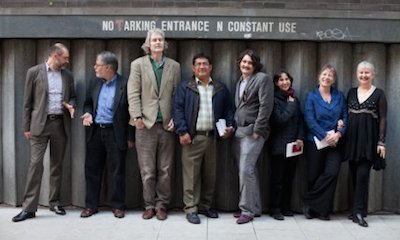
This article is also available in Spanish: ‘Tres poetas mexicanos’.
When Hernán Cortés wrote to Charles V of Spain in 1520 attempting to describe the new land he had invaded, it was with misgivings:
I am fully aware that the account will appear so wonderful as to be deemed scarcely worthy of credit; since even we who have seen these things with our own eyes, are yet so amazed as to be unable to comprehend their reality.
Here was one of the first, tentative encounters of the Spanish language with Mexico. Five hundred years on and Cortés’s question still resonates: what words can make sense of this world? It is a question for writers of Spanish, an alien language imported from distant Europe; but it is also a question for indigenous writers, for voices displaced by the Spanish invasion and now surrounded by an increasingly global reality.
In April 2010, the Poetry Translation Centre will present three of the leading figures in contemporary Mexican poetry: David Huerta (b. 1949) and Coral Bracho (b. 1951), who write in Spanish; and Víctor Terán (b. 1958), who writes in Isthmus Zapotec. Each offers a distinctive version of what it means to live in Mexico today.
Tlatelolco Massacre
As they grew up in the 1960s Coral Bracho and David Huerta were faced with pressing political realities. The Cuban Revolution of 1959 offered hope that nations across Latin America would free themselves of North American influence and achieve a more equitable distribution of resources. Enthusiasm for the Revolution merged with the more general spirit of optimism and rebellion that culminated in the global student demonstrations of 1968.
Yet on 2 October 1968, as Mexico City prepared to host the Olympic Games, students who had gathered in the Plaza de las Tres Culturas were met by the military who opened fire, resulting in a bloodbath. David Huerta was a witness of the Matanza de Tlatelolco (Tlatelolco Massacre), as it would come to be known. In a moving poem, ‘Nine Years Later – A Poem Dated’, he returns to the event and to his flight from a square filled with ‘speechless bodies crushed against their lives’.
Octavio Paz, whose Poesía en movimiento (Poetry in Movement) (1966) had drawn the authoritative map of recent Mexican poetry, resigned his diplomatic post in protest at the massacre. Less considerately, he also wrote about the events in ‘Postdata’ as the resurgence of Aztec bloodletting in a ‘ritual of expiation’. The generation who had witnessed the event were not impressed with this casual inflation of their suffering to such a symbolic plane. Paz had consistently called for the poet to address history. His statement on Tlatelolco suggested to young poets that they would have to turn away from facile historical narratives to make sense of their experience.
David Huerta’s ‘Nine Years Later’ maintains a tactful reserve about the wider significance of Tlatelolco: ‘I do not wish to speak of the scale of that afternoon / nor place here adverbs, shouts or laments.’ Indeed, much of its power comes from an almost documentary witness:
bodies laid waste, spat towards death by the zealous shrapnel:
those glistening bodies, bloody, silhouetted against the shredded light
of late afternoon.
Yet this is more than a factual account of what he had seen. The metaphors of ‘spat’, ‘shredded’ and ‘zealous’ open a window onto both the violence of the event and its power to disturb in the memory, several years later. It is a poem about a historical event, but it also reveals the ways that an imagination is haunted by that event: ‘I breathed in images, and since then all those images come to me in dreams.’ Huerta suggests that history is meaningless unless it is understood from the point of view of a human response.
Cuba
Outside Mexico, the beacon held by the Cuban Revolution would also sputter as the decade turned. In 1971 the poet Heberto Padilla was arrested and publicly humiliated at a show trial as a supposed counter-revolutionary (a scene which appears in Julian Schnabel’s film Before Night Falls). Another historical narrative had been found wanting. Both Huerta and Bracho turned instead to one of the poets who had been ostracized by Castro’s government for his homosexuality, José Lezama Lima. A genial figure (who also appears in Schnabel’s film giving advice on the books one must read), Lezama was much taken to cigars and elaborate verbal flights of the imagination. The cigars apart, he was the antithesis of Fidel Castro whose rigid certainties and dry prescriptions on the ‘new man’ of the Revolution offered thin gruel for the poet. Lezama proposed a poetry that was improvisatory, metaphorical, baroque. In a move that recalls the Anglo-American modernist fascination with the metaphysical poets, he looked to a line inspired by the sixteenth-century figure, Luis de Góngora y Argote. Here was a language that Latin Americans had taken from the Spain of Cortés and made their own, appropriating and exaggerating it as a fantastical ‘art of the counter-conquest’.
David Huerta
Lezama Lima purposefully blurred the line between the world and the poet’s imagination – language invents rather than describes reality. David Huerta’s poems frequently turn on images that are experiences in themselves. In an eerie piece, he describes a poem by Gottfried Benn:
A flower fell apart in the middle of an autopsy
and the doctor who’d cut open the corpse
saw how those petals landed among the inner organs.
This may only be a poem, but it takes hold of the speaker, removing him from his daily obligations. It is ‘something I must / come to terms with it won’t be easy but I have to do it’.
If ‘Poem by Gottfried Benn’ recalls the violence of ‘Nine Years Later’, it also revisits the earlier poem’s cathartic purpose. Huerta turns away from questionable generalizations about history to concentrate on the experience of the individual. But he doesn’t stop there; he casts a steady gaze back on the self that is the repository of that experience. This is not confessional poetry and he pokes fun at the autobiographical figure with his ‘imperious solipsistic moustache, / the hirsute landscape of minor characters’. It is an exploration of the various impulses and formulations that make up the conscious and unconscious self. ‘Thirteen Attempts on the Life of Trivial Love’ is a candid account of the feminine aspects of a masculine identity. It includes the creative principle of a ‘liquid overflowing from / the breasts I don’t possess’; but also, more disturbingly, ‘women, nightmares of mine, dead inside me – discarded like scalps’.
The self in Huerta’s poems is hard to grasp. Equally, his dealings with the outside world, and other people, are fleeting. His love poetry captures the poignancy of moments that anchor our existence only briefly. In‘Prayer’, he calls for the preservation of a moment ‘here now among us’:
it casts its yellow light and swells
like the sun or like flaming lemons
– and tastes of the sea, of loved hands
and smells like a street in Paris
where we were happy.
This elaborate figurative sequence carries the reader on a journey which engages the senses (sight, taste and smell) and startling shifts of imaginative scale (sun to lemons to sea to street). Yet its very expansiveness suggests that the experience has never quite been captured. Indeed, the present moment gives way to ‘a street in Paris’, a memory of the past, and a recognition of what is lost as well as preserved.
Coral Bracho
Coral Bracho takes the verbal exuberance of José Lezama Lima, inflecting it with a startling sensualism. ‘Water of Jellyfish’ teems with an aquatic life that is both visual and tactile:
Water of jellyfish,
milky, snaking water
of ever-changing shapes; glossy water-flesh; melting
into its lovely surroundings. Water – sumptuous waters
receding, languid.
The sheer impetus of this sequence pushes interpretive certainties aside. What is this poem about? Is it simply about water, or is it a metaphor for erotic experience? Bracho revels in the power of words to summon a mercurial imaginative world. The verbal formulations of her poem do not describe water so much as behave like it, mimicking its fluid disregard for established categories and borders.
Yet this wayward enumeration has another side. As with Huerta, it suggests a speaker reaching for an experience that remains evasive. The avidity of Bracho’s poetry is piqued by a constant awareness of loss. In‘Far-Off Settlements’a tantalising vision of childhood is no more than glimpsed as ‘children run and yell / like little blips, in never-ending quiet, / demented sepia’. The poem concludes with a characteristically vivid sensual experience which points beyond to a world that cannot be fully embodied: ‘A sly wet lick of salt in the corners of the mouth; / and this resonance, called forth.’
This pervasive sense of loss takes more explicit autobiographical form in the poem ‘Marks of Time’. Here the poet recalls a memory of her father, who would die while she was still a child. As the young girl revels in his ‘bright gaze’, she takes in the surrounding rocky landscape, transferring it as metaphor to ‘clouds of quartz, and flint, up high.’ Yet the permanence of rock on earth is just an appearance in the sky, an effect of light created by a declining sun that will leave the poem’s protagonists in darkness. Bracho wrings pathos from a realisation that the poet’s powers are not limitless.
In more recent poems there is a purposeful attempt to confront and interrogate the frequently uncanny mood of her earlier work. In the long poem Ese espacio, ese jardín (That Space, That Garden) of 2003, which is dedicated to her father, the dead return: ‘they watch us; they reflect us. They skirt round us’. Bracho explores a discovery that Pablo Neruda notoriously made in the Golden Age Spanish poet Francisco de Quevedo: that ‘when we are born we begin to die’; that ‘we are a perpetual part of death’. The here of this life and the there of death are reversed as the dead ‘trace’ and ‘reveal us / Like extremely faint features in a landscape’. Bracho’s poems have always been attracted to the fragility of human existence. As with Neruda, there is a form of solace in this experience of death as ‘a pleasure that returns, glistening’, ‘rooted in the brimming heart of life’.
Víctor Terán
Víctor Terán is a younger poet than Coral Bracho and David Huerta and inhabits a different cultural tradition. He writes in a dialect of Zapotec spoken by a mere 100,000 people living on the Isthmus of Tehuantepec in Oaxaca province. In spite of its limited extent, this region has produced a succession of notable writers. According to Carlos Montemayor, whose Los escritores indígenas actuales (Indigenous Writers Today) (1992) marks a key moment in the promotion of Mexico’s native languages, Isthmus Zapotec can claim to be the most vibrant modern example of the country’s indigenous literature.
The aspect of indigenous culture that has most commonly appealed to the literary mainstream in Latin America is its cosmogony, or vision of the universe. Both the Quiché Popol vuh and the Chilam balam of the Lowland Maya feature in works such as Miguel Ángel Asturias’s Leyendas de Guatemala (Legends of Guatemala) (1930) and Ernesto Cardenal’s Homenaje a los indios americanos (Homage to the American Indians) (1969). Readers looking for these forms of collective myth in Víctor Terán, however, will be surprised. In ‘The North Wind Whips’ the speaker muses,
Someone unthinkingly
smoked cigarettes in heaven,
left it overcast, listless.
The image is witty, urbane, a projection of the poet’s inner frustration onto the world outside rather than a communally sanctioned vision.
Carlos Montemayor has described Terán as the most ‘personal’ poet writing in Isthmus Zapotec. That is a significant claim for somebody writing in a tradition for which the concept of the individual author is a relatively recent invention. Terán’s poems frequently trace the to-and-fro of the speaker’s feelings. As his translator David Shook points out, he ‘toys with sentimentality without ever crossing into its territory’. In‘Six Variations on Love’:
Love
is wild honey that seeps from a tree,
sap of tender maize-cob generous at dawn,
sap that runs
through the intimate garden of a woman.
The abstraction of ‘love’ is grounded in precise physical observation ( maize-cob ‘at dawn’ rather than at any other time) which guides the sequence towards a particularly sexual desire. This association of sexual desire and physical environment can take startling forms. In ‘Whirlwind’, ‘My heart stretched across the bed, waiting for you’ while ‘the pigs make known / that they attack the boy squatting to do his business.’ Not only is this an unsentimental view of erotic relations, it is also a blunt portrait of rural culture.
In the Cambridge History of Latin America Gordon Brotherston remarks on the ‘tenacity of native literatures and cultures, against odds which elsewhere in the world have usually proved terminal’. This tenacity reflects an ‘inner resilience, the ability to choose from the foreign source and mould it for one’s own purposes’. Official bodies dedicated to indigenous cultures such as the Comisión Nacional para el Desarrollo de los Pueblos Indígenas and the Centro de Investigaciones y Estudios Superiores en Antropología now encourage the translation of Western literary works into native languages. In a move recalling some of the great periodicals of Spanish-speaking Mexico such as Contemporáneos and Taller, the Tehuantepec literary review Guchachireza has translated Bertolt Brecht’s ‘Ode to Study’ into Zapotec. The vibrancy of Zapotec literature is both cause and consequence of this capacity to engage with other cultures. It is a capacity those other cultures would do well to note.
Beyond Octavio Paz
Octavio Paz was the most widely recognised Mexican poet in the second half of the twentieth century. He first came to truly international notice with his Piedra de sol (Sunstone) of 1957, whose title refers to an Aztec calendar now held in the National Museum of Anthropology in Mexico City. Paz’s courting of the pre-Columbian world appealed to surrealist notions of Mexico as a mythical land and the poem was awarded the Grand Prix International de Poésie in Brussels. Yet it seems unlikely that the prize committee had looked at his work too closely. In a bizarre reading, they praised ‘the universe of stones of Octavio Paz’.
Thanks in large part to Paz, there is now a much greater awareness of the wealth of Mexico’s literary traditions. There is also a greater recognition that writers of indigenous cultures can speak for themselves. Inevitably, those voices and traditions will be modified as they are translated into other languages. English has a different vocabulary, a different grammar, a different history. Yet modern Mexico was founded on acts of translation. When Cortés sat down to try and find Spanish words for that other land, he anticipated an experience that five hundred years later would be commonplace across the globe. David Huerta, Coral Bracho and Víctor Terán each offer particular pleasures, yet they also offer fascinating insights into an experience that we can share.








